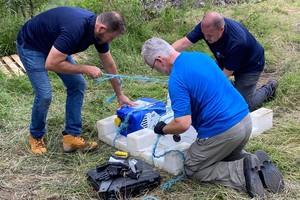Environment Agency asks anglers to be vigilant of Red Skin Disease in salmon
The Environment Agency (EA) is encouraging anglers to report sightings of salmon exhibiting symptoms of Red Skin Disease (RSD), after fish were seen with signs of the condition in Devon and Cornwall and other parts of England and Wales.
The disease, which appears as a spotted red rash on wild Atlantic salmon and sea trout, causes haemorrhaging on the underbelly of the fish.
The cause and impact of this condition is currently unknown, and despite being termed Red Skin Disease, a pathogen has yet to be linked to the changes seen. Left unchecked, the condition could have negative effects on wild stocks which are already in decline.
The EA is therefore encouraging anglers to immediately report sightings of unusual marks to the incident helpline on 0800 80 70 60.
Simon Toms, National Fisheries Management Team Leader at the Environment Agency, said:
We have received reports of a small number of fish caught by anglers showing changes consistent with red skin disease, an issue which was previously observed in 2018.
Contacting the incident hotline allows us to respond promptly to disease incidents, monitor reports and limit harm to fish species. This information also helps our partners research the condition and prevent further spread.
I’d like to remind anglers of the importance of practicing good biosecurity, and adhering to the ‘clean, check, dry’ guidance before moving to other waters when fishing for salmon this season.
Red Skin Disease was first reported in rivers draining into the Baltic Sea and Northern Atlantic in 2018. Since then, there have been a number of reports of wild salmon with RSD in rivers across the UK.
The EA is working with partners across Europe, including its own National Fisheries Laboratory, Cefas, Marine Scotland and Natural Resources Wales, to research and better understand this condition. Officers regularly monitor for signs of disease in all major salmon & trout rivers.
The National Fisheries Laboratory, alongside partner organisations and government bodies, investigates fish mortalities and researches emerging infections to protect our fisheries. All the work at this specialist facility is financed by income from the sale of rod licences.
Anglers who see diseased or distressed fish are asked to take photographs of unusual marks if safe to do so and contact the EA helpline immediately. Mild red patches on healthy salmon have long been observed but are not associated with ill-health.
Anglers should not remove or handle a fish in distress. There are no known issues for human health as a consequence of this disease.

